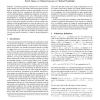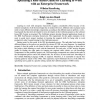1047 search results - page 89 / 210 » Learning the required number of agents for complex tasks |
GECCO
2005
Springer
14 years 1 months ago
2005
Springer
Recurrent neural networks are theoretically capable of learning complex temporal sequences, but training them through gradient-descent is too slow and unstable for practical use i...
ECAI
2004
Springer
14 years 1 months ago
2004
Springer
Abstract. Automated negotiation techniques have received considerable attention over the past decade, and much progress has been made in developing negotiation protocols and strate...
SPE
2002
13 years 7 months ago
2002
Learning to work with enterprise frameworks requires considerable effort, because of the inherent complexity of all the knowledge that is needed. However, different roles in proje...
AI
2000
Springer
13 years 7 months ago
2000
Springer
The Internet presents numerous sources of useful information--telephone directories, product catalogs, stock quotes, event listings, etc. Recently, many systems have been built th...
AAAI
2010
13 years 9 months ago
2010
It is well known that there cannot be a single "best" heuristic for optimal planning in general. One way of overcoming this is by combining admissible heuristics (e.g. b...


